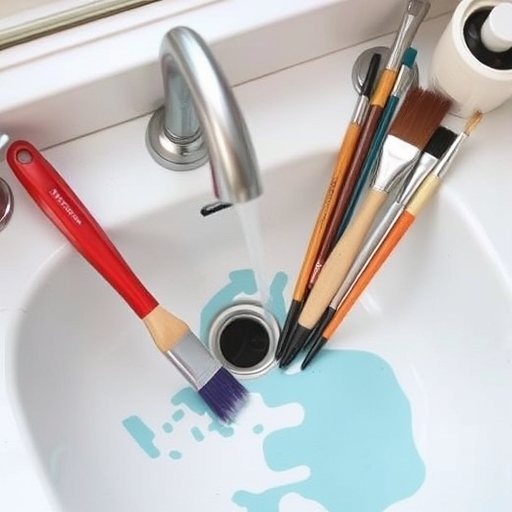Can You Wash Paint Brushes in the Sink? A Comprehensive Guide
When it comes to cleaning paint brushes, the question often arises: Can you wash paint brushes in the sink? While it may seem like a simple task, there are several factors to consider, including the type of paint, the materials used in the brushes, and the potential impact on your plumbing and the environment. In this article, we will explore the best practices for cleaning paint brushes, the implications of washing them in the sink, and alternative methods for keeping your brushes in top condition.
Understanding Different Types of Paint
Before diving into washing methods, it’s essential to understand the types of paint you may be using, as this will significantly affect how you should clean your brushes.
Water-Based Paints
- Examples: Acrylic, latex
- Cleaning Method: These types of paint can be cleaned with soap and water. They are less toxic and easier to remove from brushes.
- Examples: Alkyd, oil-based enamel
- Cleaning Method: These require solvents like mineral spirits or turpentine for cleaning. Washing them down the sink is not recommended due to the potential harm to plumbing and the environment.
- Examples: Chalk paint, fabric paint
- Cleaning Method: Depending on the base, these may require different cleaning strategies. Always check the manufacturer’s instructions.
- Water-Based Paints: Yes, you can wash them in the sink, provided you use soap and water. Ensure that you rinse thoroughly to avoid leaving paint residue.
- Oil-Based Paints: No, you should not wash oil-based paint brushes in the sink. The solvents used can damage plumbing and contaminate water sources.
- Contamination: Oil-based paints contain harmful chemicals that can leach into the water system, affecting local wildlife and ecosystems.
- Local Regulations: Many areas have regulations against disposing of hazardous materials down the drain. Check your local guidelines to avoid fines or environmental damage.
- Check Labels: Always refer to the paint label for specific cleaning instructions.
- Test on a Small Area: If unsure, test your cleaning method on a small section of the brush.
- Commercial Brush Cleaners: These are specifically formulated to break down paint and are often less harsh on brushes and the environment.
- Homemade Solutions: Vinegar and baking soda can be effective for cleaning brushes, particularly for water-based paints.
Oil-Based Paints
Specialty Paints
Can You Wash Paint Brushes in the Sink?
General Guidelines
Environmental Considerations
Washing paint brushes in the sink can have environmental repercussions, especially with oil-based paints. Here are some points to consider:
Best Practices for Cleaning Paint Brushes
Water-Based Paints
1. Rinse Immediately: As soon as you finish painting, rinse your brushes under running water to remove excess paint.
2. Use Soap: Apply a mild soap or brush cleaner to the bristles and work it in gently.
3. Rinse Thoroughly: Make sure to rinse all soap and paint from the brush until the water runs clear.
4. Shape the Bristles: After rinsing, reshape the bristles and lay the brush flat to dry.
Oil-Based Paints
1. Use Solvents: Pour a small amount of mineral spirits or turpentine into a container. Dip the brush in to dissolve the paint.
2. Wipe Off Excess: Use a rag to wipe off excess paint and solvent from the brush.
3. Wash with Soap and Water: After using solvent, wash the brush with soap and water to remove any remaining chemicals.
4. Dispose of Solvents Properly: Do not pour solvents down the sink. Check local hazardous waste disposal guidelines.
Specialty Paints
Comparison Table: Cleaning Methods for Different Paint Types
| Paint Type | Can Wash in Sink? | Recommended Cleaner | Special Considerations |
|---|---|---|---|
| Water-Based Paint | Yes | Soap and water | Rinse thoroughly |
| Oil-Based Paint | No | Mineral spirits or turpentine | Dispose of solvents properly |
| Specialty Paints | Varies | Check label | May require specific cleaners |
Alternative Cleaning Methods
If you’re concerned about washing paint brushes in the sink, consider these alternative cleaning methods:
Brush Cleaning Solutions
Rinsing Stations
If you frequently paint, consider setting up a dedicated rinsing station outside. This can be a bucket or a large container filled with soapy water:
1. Rinse Brushes: Use this station to rinse your brushes before bringing them inside.
2. Minimize Mess: This keeps your indoor plumbing free from paint residue.
3. Environmentally Friendly: Ensure you dispose of the water responsibly.
FAQ
Can I leave my brushes soaking in water?
No, leaving brushes soaking in water can damage the bristles and ruin their shape. Always rinse and clean them immediately after use.
How often should I clean my brushes?
Clean your brushes after each use. If you are using them for multiple colors in one session, you can rinse them between colors.
What should I do if my brush has dried paint?
Try soaking the brush in warm, soapy water or a solvent for oil-based paints to soften the dried paint. Gently work it out with your fingers or a comb.
Are there any eco-friendly brush cleaners?
Yes, many brands offer eco-friendly brush cleaners made from natural ingredients. You can also use vinegar or baking soda as a homemade alternative.
Can I use hot water to clean my brushes?
Hot water can be effective for water-based paints but should be avoided for oil-based paints, as it may cause the paint to bond more tightly to the bristles.
Conclusion
In conclusion, whether or not you can wash paint brushes in the sink largely depends on the type of paint you are using. Water-based paints can be safely cleaned in the sink with soap and water, while oil-based paints require more careful handling to protect both your plumbing and the environment. Always consider the implications of your cleaning methods and opt for practices that minimize harm to both your tools and the planet. By following the best practices outlined in this guide, you can ensure that your paint brushes remain in excellent condition for all your future projects.

